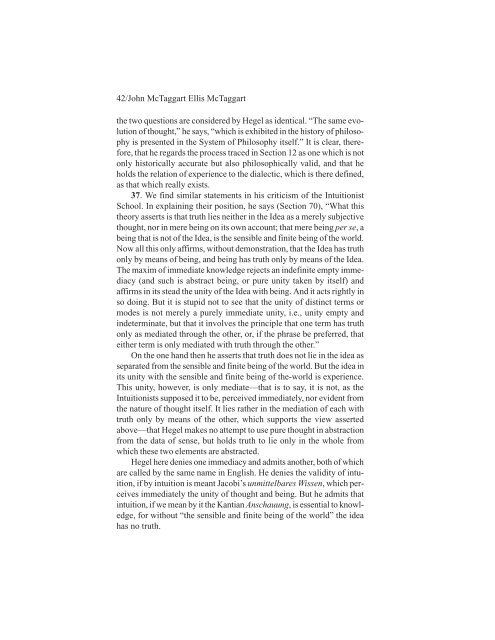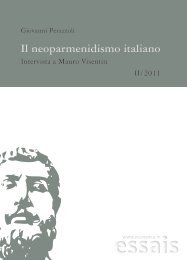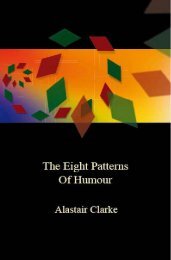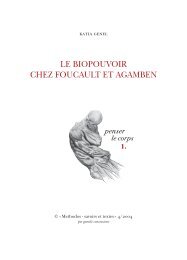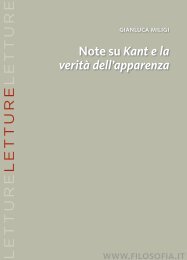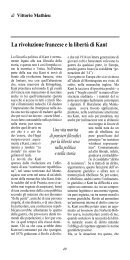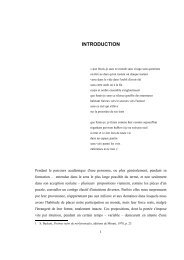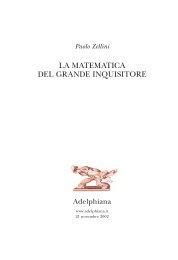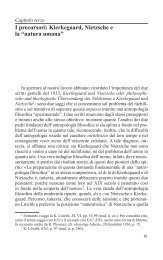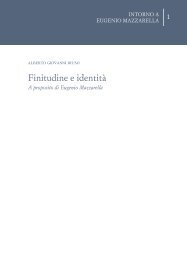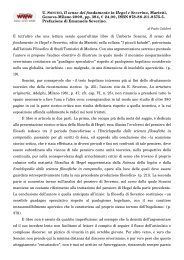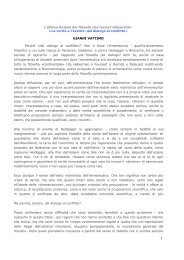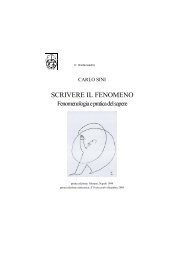McTaggart, Studies in the Hegelian Dialectic
McTaggart, Studies in the Hegelian Dialectic
McTaggart, Studies in the Hegelian Dialectic
Create successful ePaper yourself
Turn your PDF publications into a flip-book with our unique Google optimized e-Paper software.
42/John <strong>McTaggart</strong> Ellis <strong>McTaggart</strong><br />
<strong>the</strong> two questions are considered by Hegel as identical. “The same evolution<br />
of thought,” he says, “which is exhibited <strong>in</strong> <strong>the</strong> history of philosophy<br />
is presented <strong>in</strong> <strong>the</strong> System of Philosophy itself.” It is clear, <strong>the</strong>refore,<br />
that he regards <strong>the</strong> process traced <strong>in</strong> Section 12 as one which is not<br />
only historically accurate but also philosophically valid, and that he<br />
holds <strong>the</strong> relation of experience to <strong>the</strong> dialectic, which is <strong>the</strong>re def<strong>in</strong>ed,<br />
as that which really exists.<br />
37. We f<strong>in</strong>d similar statements <strong>in</strong> his criticism of <strong>the</strong> Intuitionist<br />
School. In expla<strong>in</strong><strong>in</strong>g <strong>the</strong>ir position, he says (Section 70), “What this<br />
<strong>the</strong>ory asserts is that truth lies nei<strong>the</strong>r <strong>in</strong> <strong>the</strong> Idea as a merely subjective<br />
thought, nor <strong>in</strong> mere be<strong>in</strong>g on its own account; that mere be<strong>in</strong>g per se, a<br />
be<strong>in</strong>g that is not of <strong>the</strong> Idea, is <strong>the</strong> sensible and f<strong>in</strong>ite be<strong>in</strong>g of <strong>the</strong> world.<br />
Now all this only affirms, without demonstration, that <strong>the</strong> Idea has truth<br />
only by means of be<strong>in</strong>g, and be<strong>in</strong>g has truth only by means of <strong>the</strong> Idea.<br />
The maxim of immediate knowledge rejects an <strong>in</strong>def<strong>in</strong>ite empty immediacy<br />
(and such is abstract be<strong>in</strong>g, or pure unity taken by itself) and<br />
affirms <strong>in</strong> its stead <strong>the</strong> unity of <strong>the</strong> Idea with be<strong>in</strong>g. And it acts rightly <strong>in</strong><br />
so do<strong>in</strong>g. But it is stupid not to see that <strong>the</strong> unity of dist<strong>in</strong>ct terms or<br />
modes is not merely a purely immediate unity, i.e., unity empty and<br />
<strong>in</strong>determ<strong>in</strong>ate, but that it <strong>in</strong>volves <strong>the</strong> pr<strong>in</strong>ciple that one term has truth<br />
only as mediated through <strong>the</strong> o<strong>the</strong>r, or, if <strong>the</strong> phrase be preferred, that<br />
ei<strong>the</strong>r term is only mediated with truth through <strong>the</strong> o<strong>the</strong>r.”<br />
On <strong>the</strong> one hand <strong>the</strong>n he asserts that truth does not lie <strong>in</strong> <strong>the</strong> idea as<br />
separated from <strong>the</strong> sensible and f<strong>in</strong>ite be<strong>in</strong>g of <strong>the</strong> world. But <strong>the</strong> idea <strong>in</strong><br />
its unity with <strong>the</strong> sensible and f<strong>in</strong>ite be<strong>in</strong>g of <strong>the</strong>-world is experience.<br />
This unity, however, is only mediate—that is to say, it is not, as <strong>the</strong><br />
Intuitionists supposed it to be, perceived immediately, nor evident from<br />
<strong>the</strong> nature of thought itself. It lies ra<strong>the</strong>r <strong>in</strong> <strong>the</strong> mediation of each with<br />
truth only by means of <strong>the</strong> o<strong>the</strong>r, which supports <strong>the</strong> view asserted<br />
above—that Hegel makes no attempt to use pure thought <strong>in</strong> abstraction<br />
from <strong>the</strong> data of sense, but holds truth to lie only <strong>in</strong> <strong>the</strong> whole from<br />
which <strong>the</strong>se two elements are abstracted.<br />
Hegel here denies one immediacy and admits ano<strong>the</strong>r, both of which<br />
are called by <strong>the</strong> same name <strong>in</strong> English. He denies <strong>the</strong> validity of <strong>in</strong>tuition,<br />
if by <strong>in</strong>tuition is meant Jacobi’s unmittelbares Wissen, which perceives<br />
immediately <strong>the</strong> unity of thought and be<strong>in</strong>g. But he admits that<br />
<strong>in</strong>tuition, if we mean by it <strong>the</strong> Kantian Anschauung, is essential to knowledge,<br />
for without “<strong>the</strong> sensible and f<strong>in</strong>ite be<strong>in</strong>g of <strong>the</strong> world” <strong>the</strong> idea<br />
has no truth.


